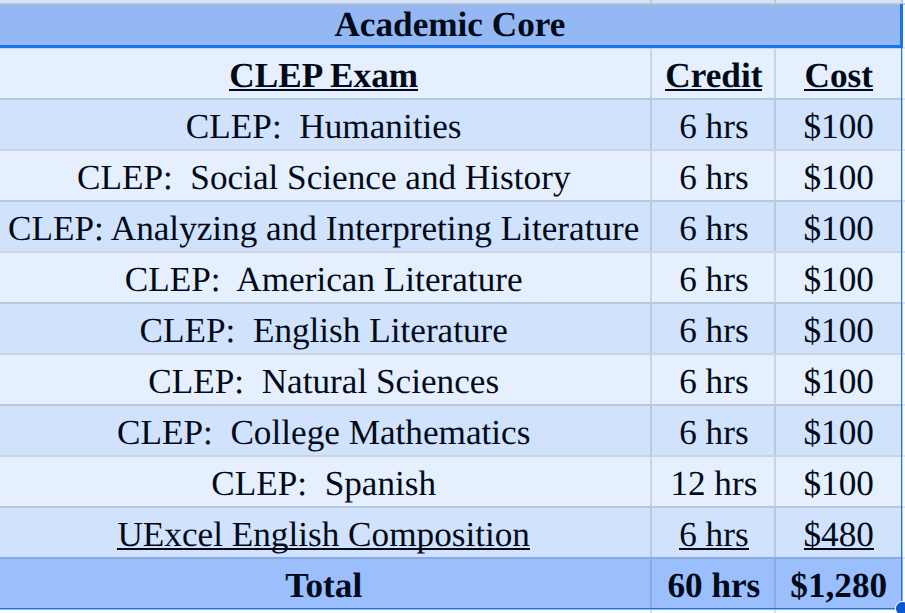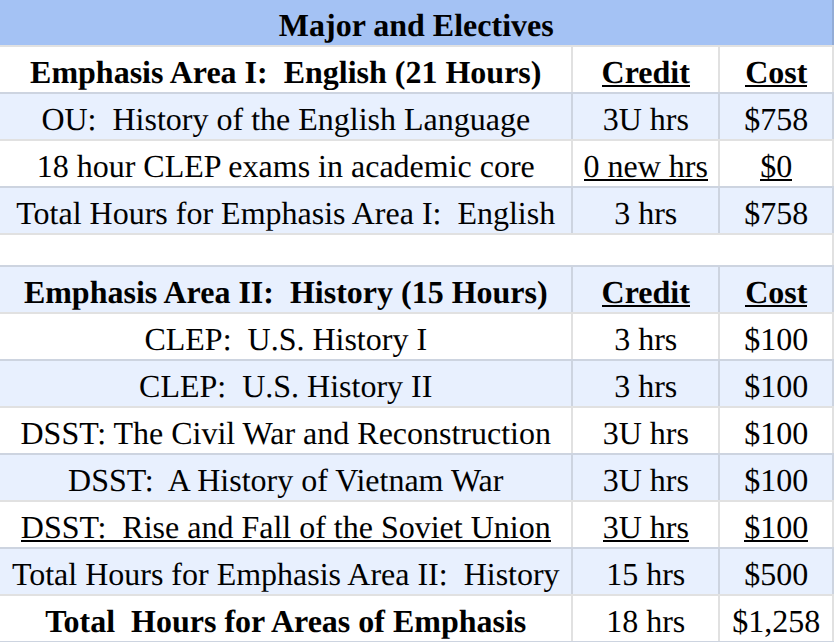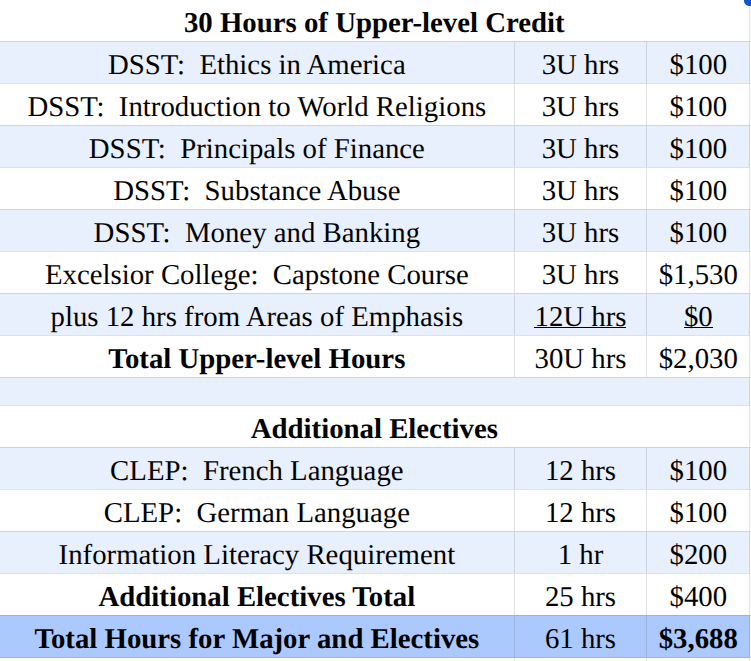A $7,500 College Degree in 12 Months?
"It's possible to earn an undergraduate degree in one year for under $7,500."

As a teacher, I value education to the utmost. Over my lifetime, I have earned four degrees, learned a few languages, and read a ton of books. In my eyes, obtaining knowledge is fun, motivating and life-changing. However, these days I have a real problem with higher education and its runaway costs. In its current form, higher education benefits academia, banks, and politicians while creating a generation of future debt slaves.
Over the last thirty years college tuition, room, and board have become insanely expensive. For example, in 1982, my freshman year, total costs at my alma mater (Davidson College...go 'Cats!) were $7,700 a year, but today it costs a cool $60,000 a year...whiskey tango hotel! To be fair, that horse-choking number represents the annual cost at a prestigious private college. It's also true that few students graduate with student loan debt over $100K, but I'd hate to start my working career with a $50k-75k anchor around my neck.

Unfortunately, tuition rates at state universities aren't that much better. Most of the young teachers that I know are state universities graduates who have at least $20K-$50K of student loan debt. Every time I hear those debt numbers my stomach hurts and my mind starts scheming of ways to earn a low-cost college degree.
This post will lay out what I would do if I were a member of the class of 2016 who couldn't rebound, shoot jump hooks, or sport an awesome mullet. I honestly believe it's possible to earn an accredited undergraduate degree in about one year for under $7,500. I know that might sound like crazy talk, but keep reading.
Degree Hacking Basics
Before I layout my degree hacking plan, we need to cover three basic questions:
What Is a College Degree Exactly?
Simply put, a college degree is 120 hours of college credit. Since most courses are worth 3 semester credit hours, 40 courses would provide enough credit hours to complete a degree. (120 credit hours / 3 credit hours = 40 courses)
Typically, a degree's coursework consists of three components: the academic core (60 hours), the major or area of concentration (30 hours), and electives (30 hours). Finally, most degrees require at least a quarter of the coursework to be upper-level course credit (30 hours of the 120 total hours). Here's a chart for my visual learners:

Can You Hack College Credits?
Are you sitting down? Good, because here is the best kept secret in academia: you can earn college credits via testing! Of course, colleges prefer that you never learn of this option because it's not in their best interest to have students graduating early. The most common credit by exam options are: CLEP and DSST. As for credit hours, CLEP exams offer from 3 to 12 hours of credit while DSST exams are worth 3 credit hours each. Both exams cost $80 per test and can be taken at testing centers around the world. There is usually a $20 fee to take the exam, so budget $100 per exam. This is a key point: CLEP and DSST exams are vital to any degree hack.
Which Institutions Accept CLEP and DSST Credits?
While many university allow as many as 30 credit hours via testing, only three accredited institutions allow students to complete the majority of their degrees via testing: Excelsior College, Charter Oak State College, and Thomas Edison State University.
In my case, I would use Excelsior College because they allow for the most credit-by-exam of the three schools. If you are interested in hacking a college degree, you should download the course catalogs from all three of these universities and start planning your degree path.
My Degree Hack:
If I were a graduating high school senior today, I would pursue a B.S. in Liberal Studies from Excelsior College for two main reasons. First, the degree is very flexible with only a few special requirements. Second, the degree would allow me to take many courses that I could pass with little to no preparation. For example, many of the academic core classes would be very similar to my high school classes: American Literature, British Literature, Natural Sciences, etc. By completing my "easy" courses first, I could devote more time to the more difficult subject areas.
My plan of attack towards a degree would have two phases. The first phase would center on hammering the academic core, basically the first two years of college. During the second phase of the plan, I would focus on the major, electives, and upper-level credits. Here's how I'd go about earning my degree:
Phase 1: the Academic Core
In order to fulfill Excelsior's academic core requirements, I would have to pass nine exams. First, I would take the eight CLEP exams below to complete the majority of my academic core. Second, I would take the English Composition exam from Excelsior College. While the UExcel exam is more expensive at $480, the exam would fulfill the written English requirement. Here's how I'd earn my first two years of college:

The cost for these nine courses yielding 60 credit hours would be a whopping $1,280! Amazing, two years of college for $1,280...that works out to $640 a year or $320 a semester!
Phase 2: Major and Electives
The B.S. in Liberal Studies does not have a formal "major" requirement. Instead, it has two "depth requirements," which are basically areas of emphasis. Each area of emphasis should have at least 12 credit hours with 3 hours of upper-level credit. In my degree quest, I would focus on courses in English and History. (At a minimum, I could become a middle school language arts and social studies teacher with this major, right?) To complete an area of emphasis in English, I would only need one upper-level English course since my academic core would already have 18 hours of English courses.
For my History emphasis area, I would take two CLEP exams for 6 credit hours and three DSST exams for 9 hours of upper-level credit. That's the plan for completing my "major;" it seems kinda easy, doesn't it? (Easy for me to say now that I'm no longer a partying 18-year old.)
The last step needed to complete the major requirements would be the online Capstone Course from Excelsior College. While it's by far the most expensive course in my plan, it would be my only course actually taken from the college. I would gladly spend $1,530 to earn my degree via testing!
The final step of my degree hack would be to fulfill the requirements for upper-level credits and additional electives. I would take five DSST exams for the upper-level credits, and I would take two CLEP tests and one correspondence course from L.S.U. for the remaining electives. The correspondence course would fulfill Excelsior College's information literacy requirement, but it is currently on hold. (If you know of any cost-effective course that could be used in lieu of the one at L.S.U., please send me a link.)


The final step of my degree hack would be to fulfill the requirements for upper-level credits and additional electives. I would take five DSST exams for the upper-level credits, and I would take two CLEP tests and one correspondence course from L.S.U. for the remaining electives. The correspondence course would fulfill Excelsior College's information literacy requirement, but it is currently on hold.
Total Costs
The cost of completing the academic core, the major, and the electives comes to $4, 968. Not too bad for an accredited undergraduate degree, right? However, there is one more fee to add to the cost of the degree: the Excelsior College enrollment fee of $2,185. In my case, I would choose the "multi-source option" because it would allow me to transfer in the bulk of my degree credit. When you add all the costs up, here is the final tally:

Final Thoughts
That's how I'd earn an inexpensive, accredited college degree within 12 months. What do you think? Could you use this information to perform your own degree hack? If you know any high school students who might benefit from this post, please send them the link. I would love to hear back from hundreds of debt-free, 18-year old college graduates, so please help me spread the word. Finally, here is the spreadsheet I used to write this post.
May this degree hacking information help someone earn their degree, avoid debt, and live life to the fullest...there is more to life than servicing debt!




